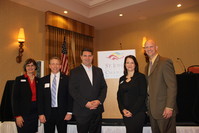

Restoring the Summer Haven River and aiding residents struggling with mental health issues were among the legislative accomplishments highlighted by local elected officials last week at the St. Johns County Chamber of Commerce quarterly Economic Development Council breakfast.
Held April 22 at the Renaissance Resort at World Golf Village, the event featured a legislative update from state Sen. Travis Hutson, state representatives Cyndi Stevenson and Paul Renner, and Board of County Commissioners Chairman Jeb Smith. In describing their activities at the county and state levels, officials noted that many of their actions were aimed at making government operate more efficiently, or in some cases undoing the damage unwittingly caused by government in the first place.
In the case of the Summer Haven River, for example, state Rep. Paul Renner noted that problems initially arose when the government stopped spending a few thousand dollars a year to replenish the dunes and maintain the area. As a result, he said, storms eroded the dunes and silt built up in the river, destroying the area’s oystering activities and impacting navigation.
“So what was originally a $1,000 problem became a multimillion-dollar problem,” Renner said.
Thanks to the efforts of local legislators, he noted, the recently passed $82 billion state budget included $2.8 million to restore the Summer Haven River.
FACT Team
Stevenson noted that residents of St. Johns and Putnam counties will now have access to expanded mental health services through $1.3 million in funding to bring a Florida Assertive Community Treatment (FACT) team to the region. Comprised of psychiatrists, nurses, case managers and other clinical professionals, the FACT team provides wraparound services to assist residents struggling with mental health issues and prevent them from requiring hospitalization.
“It costs $120,000 to care for someone in an in-patient setting,” she said, “but just $12,000 to stabilize them in an outpatient setting.”
Stevenson also discussed the recent passage of the state’s new school choice law, which allows Florida students to attend any public school in the state if there is space available.
“When I first heard about this bill, I thought the same thing everybody else did – ‘Are you crazy?’” she said. “But this bill wasn’t written for St. Johns County. It was written for people trying to find a way to get their children a good education.”
Stevenson said the law was designed for good schools that had available capacity and wanted to open seats to students who wanted them. In contrast, the top-ranked St. Johns County School District has no available capacity – a determination, she stressed, that was strictly up to local school officials to make.
Hutson noted that despite having a state delegation comprised of freshman legislators in a political environment where seniority rules, St. Johns County was well-represented due to the level of cooperation among them.
“As a freshman senator, my two colleagues next to me made my job a lot easier,” Hutson said. “We work really well together; when one of us takes the lead on an issue, the others are there to offer help and support.”
Renner agreed. “Some people worry about knowing all the rules, while others say it’s more important to know the Rule Chairman,” he quipped. “But we work cooperatively. We look at the entire Northeast Florida region and recognize that problems don’t end at the county line. Because we work together, we can outpunch our weight.”